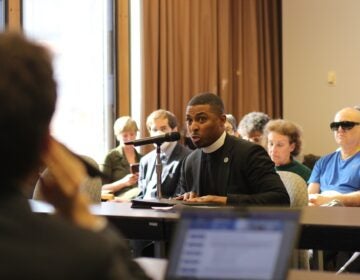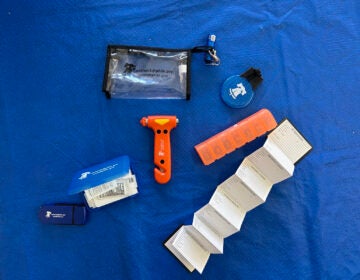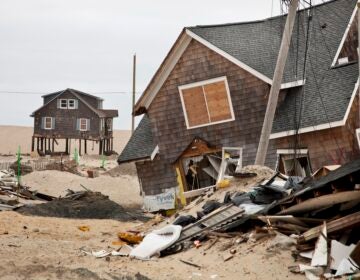Study: Climate change boosted wind speeds in 2024 Atlantic hurricanes
New research from Climate Central shows record-breaking ocean temperatures helped spin hurricanes faster, creating more destructive wind speeds.

This GOES-16 GeoColor satellite image taken at 4:40 p.m EDT and provided by National Oceanic and Atmospheric Administration (NOAA) shows Hurricane Ernesto in the Atlantic Ocean south-southwest of Bermuda, Friday, Aug. 16, 2024. (NOAA via AP)
This story is part of the WHYY News Climate Desk, bringing you news and solutions for our changing region.
From the Poconos to the Jersey Shore to the mouth of the Delaware Bay, what do you want to know about climate change? What would you like us to cover? Get in touch.
Climate change has helped spin hurricanes faster this year, boosting damaging wind speeds for every hurricane in 2024, according to a new study by the Princeton-based nonprofit Climate Central.
Each year, heat in the atmosphere and oceans provides the fuel that spawns hurricanes along the Atlantic coast between June and November. And this year’s record-breaking North Atlantic Ocean temperatures impacted each of the season’s 11 hurricanes, said Daniel Gilford, a meteorologist and atmospheric scientist with Climate Central and the lead author of the study.
“Hurricanes are a lot like the heat engine on your car,” said Gilford. “They need some fuel source in order to spin. And they will spin faster if you apply more fuel.”
The study found human-caused global warming elevated temperatures in the Atlantic Ocean by 2 to 3 degrees Fahrenheit on average, which has helped intensify the strength of hurricane winds by an average of 18 MPH, compared to what the wind speeds would have been without human-caused warming.
Gilford said his research shows climate change caused the wind speeds to increase by 9 to 28 miles per hour for all 11 hurricanes, which put some of them in a higher category on the Saffir-Simpson Hurricane Wind Scale.
“So a category change maybe doesn’t sound like that much,” said Gilford. “But it is the difference between a moderate amount of damage and a much more severe amount of damage.”
The findings show warming ocean temperatures moved seven of this season’s hurricanes to a higher scale and boosted two tropical storms to hurricane strength.
Gilford’s method of analysis is detailed in “Human-caused ocean warming has intensified recent hurricanes,” which was published this month in the peer-reviewed journal Environmental Research: Climate.
Attribution science is relatively new but refers to the ability to determine the level to which climate change has influenced extreme weather. Gilford refers to his analysis in this study as “potential intensity theory,” which imagines hurricanes as an engine, and looks at whether and how much more “fuel” is a contributing factor.
For example, Gilford said his data and modeling showed that Category 3 Hurricane Rafael, which knocked out power in Cuba, would have been a Category 1 hurricane without the warming impact of climate change.
“I think the way they’ve done it is solid and makes valid scientific sense,” said Jill Trepanier, chair of the department of geography and anthropology at Louisiana State University, where she specializes in hurricane climatology. “It relates to the observational analysis that we see related to tropical cyclones. They are rapidly intensifying at higher rates than they used to.”
Trepanier said one of the biggest concerns for any attribution study is all the other “pieces of the puzzle” that impact the hurricanes one way or another, regardless of global warming.
For example, our typical hurricane season includes seasonal variations and may be influenced by El Niño or La Niña and other “puzzle pieces.”
“No matter what, you’re going to have tropical cyclones on a planet like ours because we have some places that are really warm, like the tropics, and then those that aren’t like the poles,” said Trepanier. “So energy has to transfer somehow.”
An attributional study like this one works to tease out those factors to hone in on the actual impact of human-caused climate change, she said, but it’s not easy.
Trepanier said the most important aspect of this study is its ability to communicate the need to both individuals and local governments to prepare for more extreme weather, especially in places that have not experienced it in the past. She said Hurricane Helene’s devastation on the mountain communities in and around Asheville, N.C., is a prime example.
“I think we need to build and prepare for what’s coming,” Trepanier said. “Somebody might now have argumentative power to get that funding to build a new and improved levee structure or protective devices to protect their city or their community.”
She said the earth itself has a system for regulation, but how humans will fare is an open question.
“We have to stop building right along the coastlines,” she said. “We have to be mindful of higher quality building patterns. We need large systematic changes that very few people have a lot of control over.”
But she said individuals, by knowing these can strike and strike harder, can prepare by creating things like hurricane kits.

Get daily updates from WHYY News!
WHYY is your source for fact-based, in-depth journalism and information. As a nonprofit organization, we rely on financial support from readers like you. Please give today.






